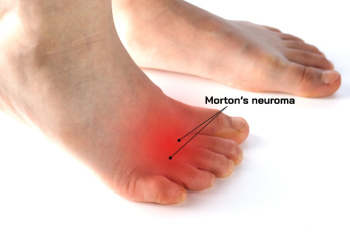Understanding Morton's Neuroma
Tuesday, 07 January 2025 00:00
Morton’s neuroma is a painful condition affecting the ball of the foot, often between the third and fourth toes. It occurs when the tissue surrounding a nerve becomes thickened, causing pain, burning, or a sensation of something being wedged in the shoe. The pain can worsen when walking, standing, or wearing tight shoes. The primary cause of Morton’s neuroma is excessive pressure or irritation on the nerve, often from wearing high heels, tight shoes, or engaging in repetitive activities like running. Foot deformities, such as bunions or hammertoes, can also increase the risk. A podiatrist can help diagnose Morton’s neuroma through a physical exam and imaging tests. Treatments may include wearing custom orthotics, padding, or shoe modifications to reduce pressure on the affected area. In more severe cases, corticosteroid injections or even surgery may be recommended. If you have pain in this part of your foot, it is suggested that you schedule an appointment with a podiatrist.
Morton’s neuroma is a very uncomfortable condition to live with. If you think you have Morton’s neuroma, contact one of our podiatrists of Coastal Foot & Ankle Wellness Center, LLC. Our doctors will attend to all of your foot care needs and answer any of your related questions.
Morton’s Neuroma
Morton's neuroma is a painful foot condition that commonly affects the areas between the second and third or third and fourth toe, although other areas of the foot are also susceptible. Morton’s neuroma is caused by an inflamed nerve in the foot that is being squeezed and aggravated by surrounding bones.
What Increases the Chances of Having Morton’s Neuroma?
- Ill-fitting high heels or shoes that add pressure to the toe or foot
- Jogging, running or any sport that involves constant impact to the foot
- Flat feet, bunions, and any other foot deformities
Morton’s neuroma is a very treatable condition. Orthotics and shoe inserts can often be used to alleviate the pain on the forefront of the feet. In more severe cases, corticosteroids can also be prescribed. In order to figure out the best treatment for your neuroma, it’s recommended to seek the care of a podiatrist who can diagnose your condition and provide different treatment options.
If you have any questions, please feel free to contact one of our offices located in St. Augustine, and Palatka, FL . We offer the newest diagnostic and treatment technologies for all your foot care needs.







